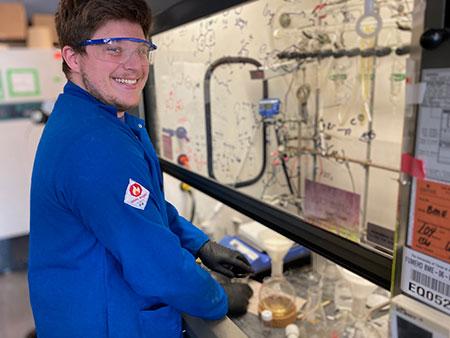Learn More About Our Program
Eligibility & Admissions
Applicants should hold a baccalaureate degree in a discipline such as pharmacy, chemistry, biochemistry or biology. This training should include the following coursework: two semesters each of calculus, organic chemistry, and pharmaceutical or biological sciences and one semester of physical chemistry.
Additional details about eligibility and admissions can be found on the Research & Graduate Studies site.

Ph.D. Graduate Program
Degree Details
Degree Requirements
The student’s academic and research programs are tailored to meet his or her specific interests and professional goals and are decided upon by that student and his/her supervising professor. However, all students take a set of “core” courses in advanced organic chemistry, advanced medicinal chemistry, advanced biochemistry and molecular biology (12 semester hours). Within one calendar year of admission, each student declares a sub-specialization in Chemical Biology/Medicinal Chemistry (synthetic medicinal chemistry, bioorganic chemistry or structural molecular biology) and fulfills the core requirements of that sub-specialization.
Following completion of the core requirements, and typically near the end of the second year of study, the student will be required to take the candidacy examination. For this examination, the student submits a written proposal (in NIH/NSF style) to the examination committee concerning the student’s research and results so far. This document serves as the basis for the oral candidacy examination. Upon successful completion of the written and oral examinations, the student is admitted to candidacy, and the dissertation committee is formulated and charged with supervising the dissertation research and final defense.
Progression
Progression through the Chemical Biology and Medicinal Chemistry Ph.D. program involves the satisfactory completion of 8 didactic courses, 2-3 research laboratory rotations, participation in the seminar series including the presentation of a departmental seminar, two long semesters as a teaching assistant, qualifying examination, development and execution of a successful original research project under the supervision of a faculty member, a written dissertation, and the defense of the dissertation. These requirements are described in detail in this section, and in all cases, are dependent upon approval from the appropriate advisors. In brief:
a) Students are required to take four core courses or equivalent courses (Physical Organic Chemistry, Biochemistry, Molecular Biology, and Medicinal Chemistry) and four additional courses selected in consultation with the Supervising Professor. These courses cover topics in bio-organic chemistry, mechanistic enzymology, structural biology, drug discovery, and synthetic organic chemistry and are offered by Division faculty and by Chemistry and Molecular Biosciences faculty. Students must complete courses with a grade of B- or above (but maintain a 3.0 GPA).
b) Students are strongly encouraged to carry out 2-3 research rotations in their first semester. The rotations are discussed with and scheduled by the Academic Advisor. This requirement may be waived in consultation with the Academic Advisor. At the end of the rotations, students select a Supervising Professor.
c) Students must attend the Division seminar series every long semester and present a divisional seminar in their third long semester. The Academic Advisor will notify the student in order to schedule to the seminar.
d) Students must serve as teaching assistants for two long semesters in the College of Pharmacy, the Department of Chemistry, Molecular Biosciences, or related departments.
e) Students must successfully pass a written and oral qualifying examination. The exam topic will be your proposed dissertation research project. Students prepare a 10-15 page proposal (independently) and defend the proposal after a 20-30 minute presentation (of the proposal).
f) Under the direction of the Supervising Professor, students complete the dissertation research project, write a dissertation, and defend the dissertation. Students must make satisfactory progress on their research project each semester, as determined by the Supervising Professor, in order to complete the Ph.D.
Graduate Student Handbook
For detailed curriculum, other requirements and additional information, please refer to the Chemical Biology and Medicinal Chemistry division handbook (PDF).
Core Course Requirements (required of all students unless waived by the Academic Advisor)
Listed below are the core course requirements that must be satisfied before a student may apply for doctoral candidacy. It should be noted that courses are not offered every semester and are subject to change.
- CH 386J, Advanced Organic Chemistry (Fall)
- CH 391/BCH 339J, Chemical and Synthetic Biology (Fall)1
- CH 395J, Genes, Genomes, and Gene Expression (Fall)1
- PGS 396M, Medicinal Chemistry: General Principles, Pharmacological Classification, and Mechanism of Action (Summer)
1Can be replaced with other courses with permission.
Electives (Choose 4)
- PGS 388C, Introductory Bioorganic Chemistry (Enzyme Catalysts, Mechanisms and Applications)
- BCH 339J, Chemical and Synthetic Biology
- BCH 394P, Bioinformatics
- CH 386K, Advanced (Synthetic) Organic Chemistry (Spring)
- BCH 387D, Physical Methods in Biochemistry and Molecular Biology
- BCH 394, Structure and Function of Proteins & Nucleic Acids (Spring)
- PGS 386N, Chemical Biology in Drug Design (Spring)
- PGS 387Q, Communication Skills for Scientists
- PGS 382V, Pharm Biotechnology
- PGS 383M, Health Innovation Entrepreneurship
- PGS 388K, Molecular Mechanisms and Methods in Nutrition and Cancer
- MOL 395H, Cell Biology (Spring)
- BCH 395G, Structure/Function Proteins/Membranes (Spring)
- BIO 394M, Tumor Biology
Students may enroll in other courses with the approval of the Academic Advisor and Supervising Professor.
Career Opportunities
Alumni find rewarding careers in all sectors of the scientific community. Salaries and advancement opportunities compare favorably with graduates in other biochemical and pharmaceutical sciences.
Recent graduates from our program have assumed positions at academic institutions, medical schools, the Food and Drug Administration and in pharmaceutical industry.

